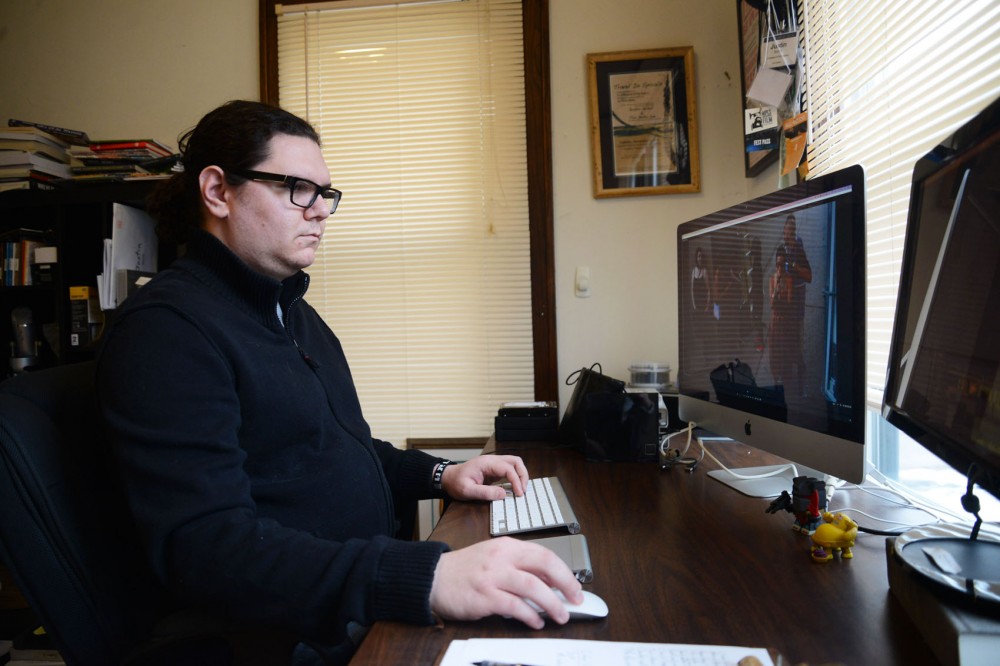University of Minnesota Cultural Studies and Comparative Literature graduate school alum Justin Schell traveled across the globe for his Ph.D. dissertation. When he got back, he found that he couldn’t fit all of his experiences into his paper.
Over the course of several years, Schell worked with Twin Cities hip-hop artists Maria Isa, M.anifest and Tou SaiKo Lee — filmed their performances, conducted interviews and most notably, documented their trips to their country of ethnicity. He presents his work in his documentary, “We Rock Long Distance.” The film explores intergenerational relationships and the diaspora of hip hop as the artists talk with their family and share their work with the community.
“I think it does definitely highlight these artists, not just as artists who put out CDs and music, but artists as people with a lot more to them culturally and what they take on as people,” Lee said.
When Schell initially contacted the artists, his only goal was to contribute articles to a hip-hop encyclopedia. But as he got to know them, he became interested in their connections with their grandparents and their roots in other countries.
The relationships the artists hold with their visited country vary — M.anifest grew up in Ghana, while Isa grew up in Minnesota but visited Puerto Rico throughout her life. Lee moved to the United States from a Hmong refugee camp in Thailand as a baby and revisited the country once, prior to his trip there with Schell.
He hoped to write a dissertation on all three artists but realized that his level of depth required three dissertations. He focused on M.anifest for his paper but still visited the countries prior to writing his dissertation.
“I tend to take on big things and sort out the pieces later,” Schell said.
In the meantime, he helped Lee create a documentary titled “Travel in Spirals” about Lee’s first visit to Thailand. He also re-visited Ghana for a conference with M.anifest’s grandfather, world-renowned ethnomusicologist, J. H. Kwabena Nketia.
Schell strived to give back to each community he visited. When he went to Thailand with Lee, he showed “Travel in Spirals,” to the people involved. While there, he made DVDs of his recent footage for people there before he left. In Ghana, he brought back photos from a previous visit that he professionally developed to withstand humidity. He also helped M.anifest’s grandfather digitize old tapes.
“[I was] trying to address that sort of asymmetrical power relationship in these kinds of things where an American goes to other places and does this film, and as much as I could, try to give back as well,” Schell said. “I would love to take the film back and show it … and dub the whole thing in Hmong, which is a challenge.”
Robert Brown, Schell’s CSCL advisor, credited Schell’s character as a reason to his success.
“He’s a white guy who can win the confidence of Asian and African and Puerto Rican musicians. I mean, that’s really something,” he said. “He’s righteous enough and sensitive enough and empathetic enough to win the trust of these people. I think that’s quite an accomplishment.”
Schell said he tries to find a balance between organic happenings and those that couldn’t have happened without the film. He labored over selecting footage to create the most cohesive, accurate story.
“People think that in documentary filming, you’re telling someone else’s story, and you’re not. You’re telling your own story of someone else’s story,” he said.
Schell’s thoughtful interviews and attention to detail proved impactful for Lee and Isa.
“It kind of put me in a situation where I felt like I needed to dig deeper than I usually would have if I just went there leisurely,” Lee said. “Justin really helped with meaningful questions and got us to look at things from different perspectives.”
Likewise, Isa found the process of documenting the trip rewarding.
“Being able to go visit family members who have been supporting my music … for them to tell me that they actually listen to my music and show me newspaper clippings that they had been collecting, that I didn’t even know of, that just meant a lot to me, and the fact that it’s documented is important,” Isa said.
Lee said he feels the film portrays some of Minnesotan immigrants’ common struggles and goals.
“We feel like, as a newer generation, we embrace the new culture and the new styles such as hip hop, but then we want to honor our history and our elders and our culture at the same time, and I feel like that’s a really powerful aspect of this film,” Lee said.
What: “We Rock Long Distance”
Where: Intermedia Arts Center, 2822 S. Lyndale Ave., Minneapolis
When: 7:30 p.m. Friday and Saturday
Cost: $7-9








